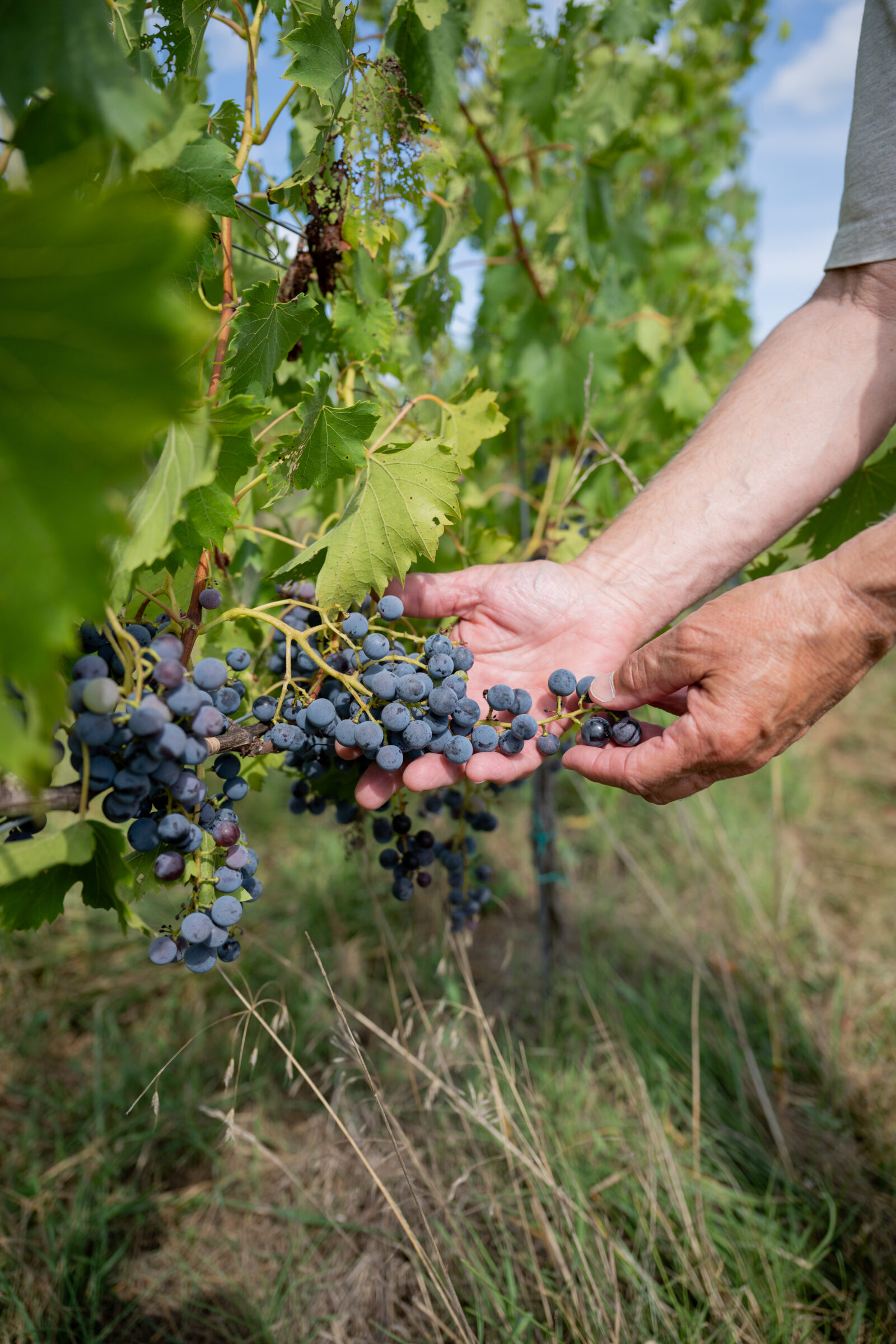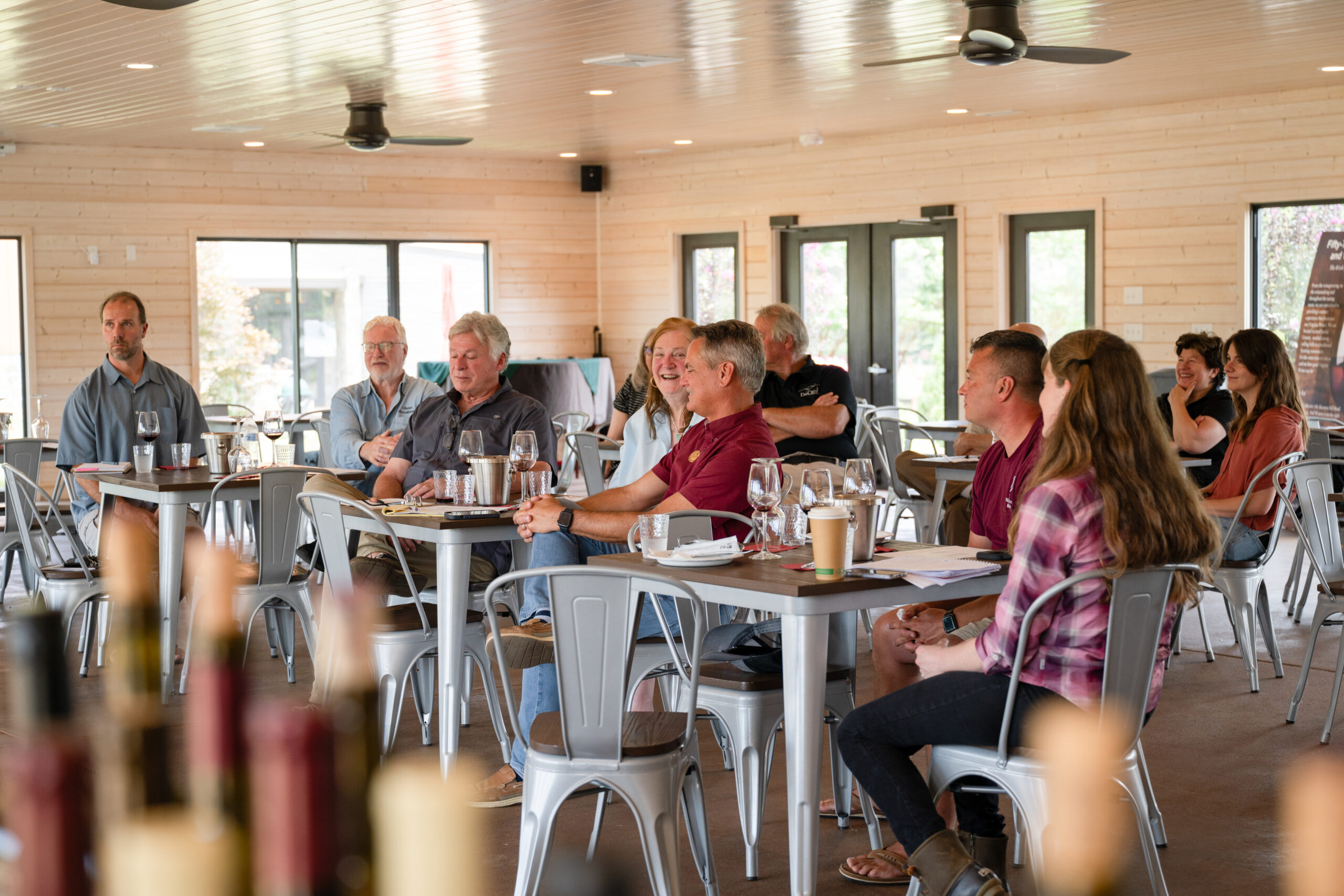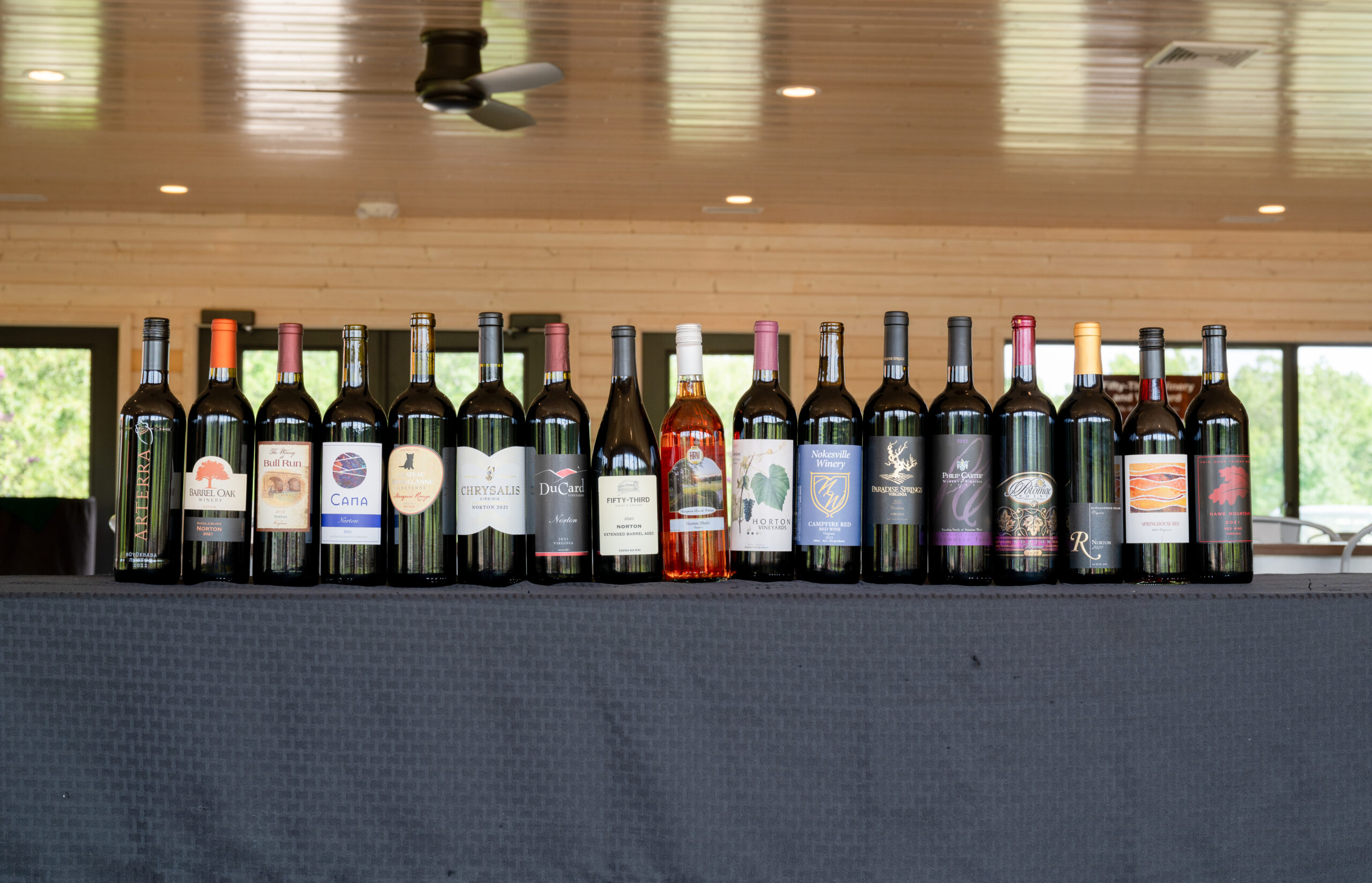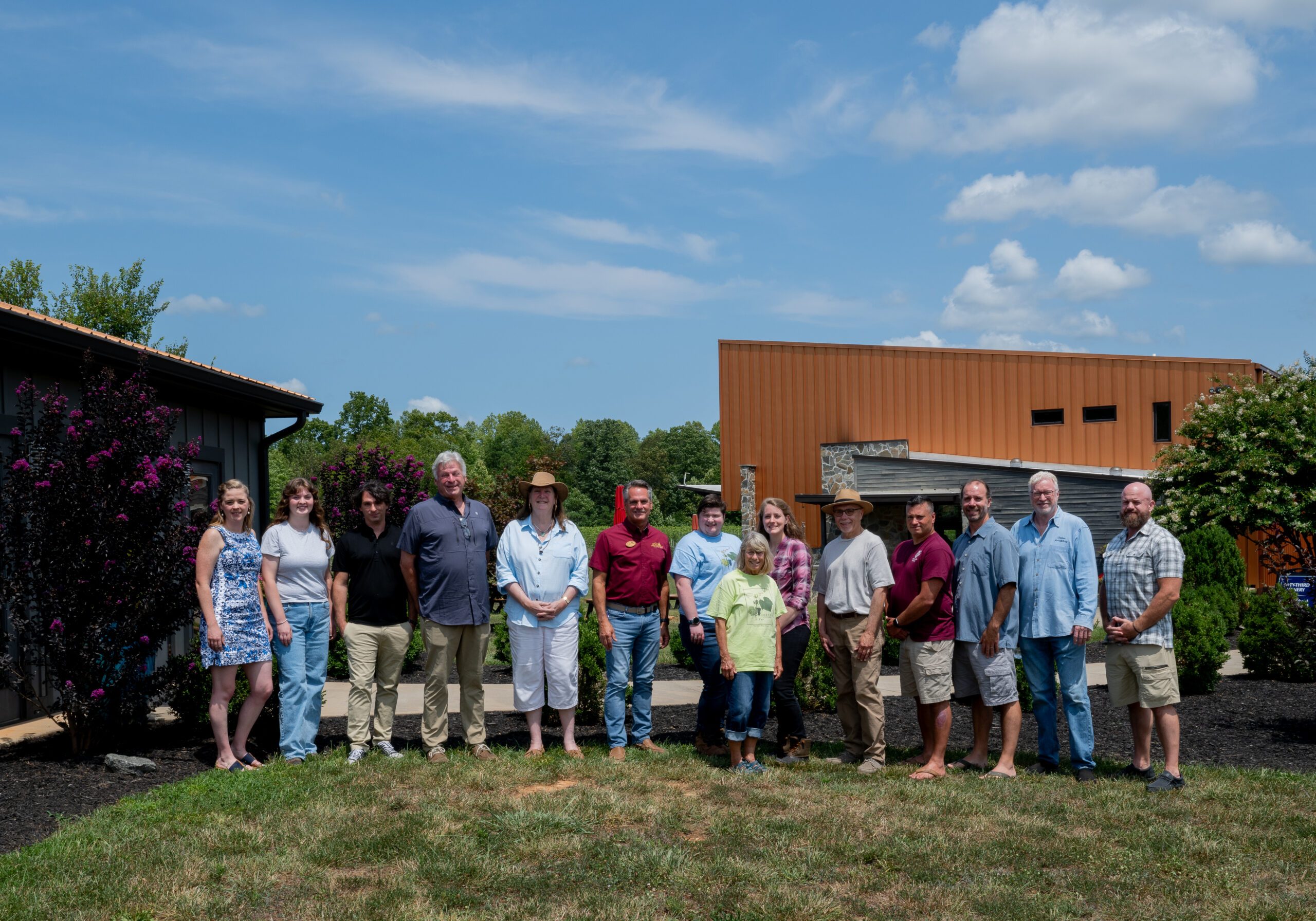The Norton Network Rallies Around Virginia’s Grape

Written by Kaitlin Hill | Photos by Hannah Hazel Photography
“It’s very unique, but it is not for everybody,” Skip Causey says of the Norton grape and, by extension, wines produced from it. Causey, owner of Potomac Point Winery in Stafford, Virginia, continues, “But we are finding that it has a cult following. And people want to know what your Norton is, because some people do it very differently.”
The range of expression from the Norton grape is advocated for and captured by members of The Norton Network, a group of 22 wineries and vineyards from all over Virginia with the aim of educating the public about “Virginia’s Native Grape.”
“I love the idea that they put us all together,” Causey adds with a nod to Chrysalis Vineyards owner Jenni McCloud, marketing and public relations manager Jill Smedley, and winemaker Jake Blodinger.
For us, joining the Network was obvious. We all have this grape that we want to showcase and it was a common thread. –Horton
Smedley says, “We wanted to have a Norton Wine Day. There is a Syrah Day — why isn’t there a Norton Day? And it snowballed from there into, let’s have a whole weekend, or a whole month.”
McCloud interjects, “Let’s have a decade!”

McCloud’s enthusiasm for the grape is shared by the members who have joined her in the Network. Sharon Horton of Horton Vineyards in Gordonsville says, “For us, joining the Network was obvious. We all have this grape that we want to showcase and it was a common thread.” She adds with a laugh, “These are our people, and we want to spend time with our people and showcase what Virginia does through this one particular variety.”
Kirk Wiles of Paradise Springs shares, “We’ve been making Norton since 2008. Norton is distinctly Virginia and we want to embrace that sense of place and terroir.” He continues, “People either gravitate toward it or it’s not for them, but it is really a talking point in the tasting room. It’s part of Virginia’s wine history.”
The grape’s history is a huge part of the appeal, according to Anna Want of Casanel Vineyards in Leesburg. Of her decision to produce Norton and join the Network, she says, “We were definitely attracted to the history. We fell in love with the story of it.” She adds, “It’s the wild vine. We just let it do what it wants to do. It has its own personality and way of doing things.”
Norton is like the punk rock of the wine industry. –Allen
Dustin Miner of Nokesville Winery echoes Want’s sentiments, recalling, “When I tasted my first Norton, it was very, very different. And when you realize the story behind it, it’s a wine made from tragedy.”
That story is perhaps best known by McCloud and Horton’s father, the late Dennis Horton. “Historically, you couldn’t come up with a better story about a native grape,” McCloud says.

The Norton seed was originally cultivated in the early 1800s by Dr. Daniel Norborne Norton, a horticulturalist in Richmond, Virginia. The grape’s exact parentage is unknown, as he was experimenting with the crossbreeding of many breeds.
The grape made its way across America, notably taking root in Hermann, Missouri, in the 1840s, and enjoying its heyday in the 1870s, ’80s, and ’90s, prized for its resistance to disease.
McCloud continues, “It was once world-renowned until Prohibition decimated the vineyards, the records, and the facilities.”
Matthew Allen of Piedmont Meadows says, “Norton is like the punk rock of the wine industry. It was almost completely wiped out during Prohibition, and there was this one rebel monk in Missouri who had saved a few vines so that he could make wine for religious practices. And from those vines, we saw the resurgence that came later.”
Pre-Prohibition plantings were discovered in 1965 at Stone Hill Winery in Hermann, Missouri. McCloud shares, “The first plantings that Dennis [Horton] and I did came from Stone Hill cuttings, where that vine was found.”
McCloud and the members of the Network seek to restore Norton to its former glory and, perhaps, convert Norton skeptics through advocacy and education. The group will host a Norton Wine Tour from October 18 to November 10 and feature stops at Norton Network wineries and vineyards.

On what they hope their efforts will achieve, Wiles offers, “To change the perception of what Norton can be. To show that if you really love the grape, you can make some fantastic wines from it, and that not all Nortons are the same.”
Father-daughter duo John Delmare and Kelly Knight of Rappahannock Cellars echo Wiles’ note on flexibility. Knight explains, “Everybody’s putting their own customized stamp on it. We make a sparkling wine Norton; we make a dessert wine port-style Norton. Norton is really versatile and we need to get that word out there.”
Causey adds, “I like this about the tour: [Participants] can go taste eight different styles of Norton in a weekend and see how complex it is, that it is not a unilateral wine, and that it can be a very fun varietal to play with.”
That versatility will be on display during the wine tour, where each vineyard and winery will highlight their library of Norton and how it can change over time. Causey explains, “I think all of us have the idea of showcasing what it does when it is young and over a long period of time, because that is a unique part about the Norton.”
This year is about starting the conversation in a very large and collaborative way. –Smedley
Horton shares, “We’re opening our bottles from 30 years ago. So, 1994 to present, the whole library will be open for tasting.”
Wiles laughs, “We’re not going back to ’94, because I was 12 years old then, but we are going to dig into the library and bring up some Norton we made 10, 12, 14 years ago … to show how beautifully it’s aged and how nicely the acid has softened.”
As the Norton Network members gear up for Virginia Wine Month and the Norton Wine Tour, Horton’s concept of a “common thread” is on full display. As Smedley says, “This year is about starting the conversation in a very large and collaborative way.” And Allen finishes, “The Norton Network is really a win for Virginia. We can work together as a collective better than we can individually to share what works best, [what] one harvest year looks like versus the next in terms of how we’re managing the winemaking process, and to collectively put an effort forward to make the Norton great.” ML
Norton Wine Tour Dates
October 18 – 20: Arterra Wines, Barrel Oak Winery & Brewery, Bluemont Vineyard, Cana Vineyards & Winery of Middleburg, Casanel Vineyards & Winery, Chrysalis Vineyards at The Ag District, Fleetwood Farm Winery, Philip Carter Winery, Rappahannock Cellars, and Slater Run Vineyards.
October 25 – 27: Chateau MerrillAnne, DuCard Vineyards, Fifty-Third Winery and Vineyard, and Horton Vineyards.
November 1 – 3: Hampton Roads Winery and Spinning Jenny Vineyard.
November 8 – 10: Nokesville Winery, Paradise Springs Winery, Piedmont Meadows, Potomac Point Winery & Vineyard, The Winery at Bull Run, and Twin Oaks Tavern Winery.
Additional Wineries: Poorhouse Vineyard (Norton celebration date TBA).
Published in the October 2024 issue of Middleburg Life.








